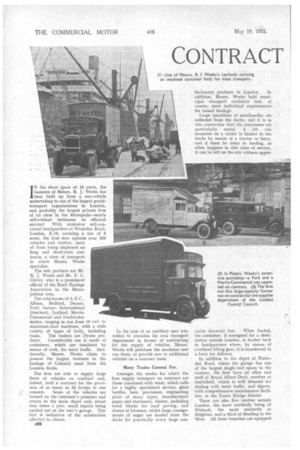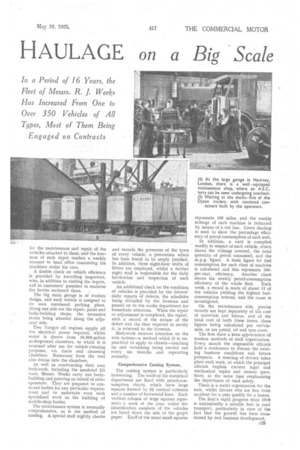CONTRACT
Page 82

Page 83

If you've noticed an error in this article please click here to report it so we can fix it.
HAULAGE on a Big Scale "N the short space of 16 years, the business of Messrs. R. J. Weeks has been built up from a one-vehicle undertaking to one of the largest goodstransport organizations in London, and probably the largest private firm of its class in the Metropolis—surely self-evident testimony to efficient service? With extensive self-contained headquarters at Waterden Road, London, E.15, covering a site of 3 acres, the firm now operate over 350 vehicles and trailers, most of them being employed on long and short-term contracts, a class of transport in which Messrs. Weeks specialize.
The sole partners are Mr. R. J. Weeks and Mr. F. C. Glover, who is a prominent official of the._ Road Haulage Association in the Metropolitan area.
The vehicles are of A.E.C., Albion, Bedford, Dennis, Ford, Garner, International (tractors), Leyland, MorrisCommercial and Studebaker makes, ranging in size from 10 cwt. to maximum-load machines, with a wide variety of types of body, including tanks. The trailers are Dyson pro . ducts. Considerable use is made of containers, which are insulated by means of cork, for meat traffic. Incidentally, Messrs. Weeks claim to possess the largest business in the haulage of Colonial meat from the London docks.
The firm are able to supply large fleets of vehicles on contract and, indeed, hold a contract for the provision of as many as 52 lorries to one
concern. Some of the vehicles are housed on the customer's premises and return to the main depot onlyabout four times a year, small repairs being .carried out at the user's garage. This fact is indicative of the satisfaction afforded to clients.
e24 In the case of an ancillary user who wishes to abandon his own transport department in favour of contracting for the supply of vehicles, Messrs. Weeks will purchase. the machines and run them, or provide new or additional vehicles on a contract basis.
Many Trades Catered For.
Amongst the trades for which the firm supply transport on contract are those concerned with meat, which calls for a highly specialized service, glass bottles, beer, provisions, engineering plant of many types, manufactured paper and stationery, timber, including wood blocks for road paving, and drums of bitumen, whilst large consignments of sugar are hauled from the docks for practically every large con ciable financial loss, When loaded, the container, if consigned for a destination outside London, is hauled back to headquarters where, by means of overhead lifting gear, it is transferred to a lorry for delivery.
In addition to the depot at Waterden Road, where the garage has one of the largest single-roof spans in the country, the firm have an office and staff at Royal Albert Dock, another at Smithfield, which is well situated -for dealing with meat traffic, and depots, with comprehensive maintenance facilities, in the Tower Bridge district.
There are also five centres outside London, the most northerly being at Wisbech, the most southerly at Brighton, and a third at Reading in. the West. All these branches are equipped
for the maintenance and repair of the vehicles attached tei thene,and.the foreman of each depot renders a weekly account to head office concerning the machines under his care.
A double check on vehicle efficiency is provided by travelling inspectors, who, in addition to visiting the depots, call at customers' premises to examine the lorries stationed there.
The big main garage is of modem design, and each vehicle is assigned to s own numbered parking place. Along one side are the repair, paint and body-building shops, the extensive stores being situated along the adjacent side.
Two Tangye oil engines supply all the electrical power required, whilst water is drawn from 10,000-gallon underground chambers, to which it is returned after use for vehicle-cleaning purposes, via ducts and cleansing chambers.' Rainwater from the roof also drains into the chambers.
As well as constructing their own bodywork, including the insulated lift vans, Messrs. Weeks carry out bodybuilding and painting on behalf of other operators. They are prepared to construct bodies for any particular requirement and to undertake even such specialized work as the building of mobile-shop bodies.
The maintenance system is unusually comprehensive, as is the method of costing. A special staff nightly checks and records the pressures of the tyre's of every vehicle, .a 'precaution which has been found to be amply justified. In addition, three eight-hour shifts of fitters are employed, whilst a further night staff is responsible for the daily lubrication and inspection of each vehicle.
An additional check on the condition of vehicles is provided by the drivers' daily reports of defects, the schedules being initialled by the foreman and passed on to the• works department for immediate attention. When the repair or adjustment is completed, the report, with a record of the nature of the defect and the time required to rectify it, is returned to the foreman.
Bodywork receives attention on the rota system—a method which it is unpractical to apply to chassis—touching up and varnishing being carried out every six months and repainting annually.
Comprehensive Costing System.
The costing system is particularly interesting. The walls of the statistical department are lined with petrol-consumption charts, which have large squares formed by 52 vertical columns and a number of horizontal lines. Each vertical column of large squares represents a week of the year, whilst the identification numbers of the vehicles are listed down the side of the graph paper, Eacli of the usual small squares represents 100 miles, and the weekly mileage of each machine is indicated by means of a red line. Green shading is used to show the percentage efficiency of petrol consumption of each unit.
• In addition, a card is compiled weekly, in respect of each vehicle, which shows the mileage covered, the total Ruantity, of petrol consumed, and the m.p.g. figure. A basic figure for fuel consumption for each class of machine is calculated and this represents 100per-cent. efficiency. Another chart shows the weekly petrol-consumption
efficiency of the whole fleet. Each week, a record is made of about 12 of the vehicles yielding the highest fuelconsumption returns, and the cause is investigated.
On the maintenance side, precise records are kept separately of the cost of materials and labour, and of the total cost of both these items, these figures being calculated per vehiclemile, as are petrol, oil and tyre costs.
The firm show a keen appreciation of modern methods of staff organization. Every month the responsible officials hold a conference to discuss the existing business conditions and future prospects. A meeting of drivers takes place each week, at which the principal officials explain current legal and mechanical topics and answer questions, at the same time emphasizing the importance of road safety.
There is a social organization for the men, whilst drivers who are free from accident for a year qualify for a bonus.
The firm's rapid progress since 1919 is undoubtedly a notable feat in road transport, particularly in view of the fact that the growth has been occasioned by real business development.




































































































































































